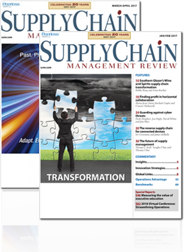
By Johanna Schönberger and Kim Sundtoft Hald ·
March 4, 2024
In a world where managers must develop capabilities that enable the management of supply chains under increasing uncertainty, flexibility is more important than ever before. In our research, we have identified nine fundamental drivers of supply chain flexibility. In this paper, we present these drivers as part of a new model, the SC-Flexibility Drivers Matrix, designed to help supply chain managers develop flexibility in their supply chains.
The relevance of supply chain flexibility in today’s world
The post-pandemic world can be described as a VUCA world—as it is volatile, uncertain, complex, and ambiguous. Although the COVID-19 pandemic turned out to be the start, there are plenty of other recent events, such as the ongoing Russia-Ukraine war, the U.S.-Taiwan-China conflict, the Suez Canal blockage, and the recent Israel-Hamas war in Gaza, that have resulted in major global supply chain disruptions.
In today’s global and interconnected supply chains, one important observation is that these natural and political disruptions spread extremely fast. This challenges supply chain managers and requires them to implement flexibility in their supply chains.

By Johanna Schönberger and Kim Sundtoft Hald ·
March 4, 2024
In a world where managers must develop capabilities that enable the management of supply chains under increasing uncertainty, flexibility is more important than ever before. In our research, we have identified nine fundamental drivers of supply chain flexibility. In this paper, we present these drivers as part of a new model, the SC-Flexibility Drivers Matrix, designed to help supply chain managers develop flexibility in their supply chains.
The relevance of supply chain flexibility in today’s world
The post-pandemic world can be described as a VUCA world—as it is volatile, uncertain, complex, and ambiguous. Although the COVID-19 pandemic turned out to be the start, there are plenty of other recent events, such as the ongoing Russia-Ukraine war, the U.S.-Taiwan-China conflict, the Suez Canal blockage, and the recent Israel-Hamas war in Gaza, that have resulted in major global supply chain disruptions.
In today’s global and interconnected supply chains, one important observation is that these natural and political disruptions spread extremely fast. This challenges supply chain managers and requires them to implement flexibility in their supply chains.

March 4, 2024

Subscribe to Supply Chain Management Review Magazine!
Subscribe today. Don’t Miss Out!
Get in-depth coverage from industry experts with proven techniques for cutting supply chain costs and case studies in supply chain best practices.
Start Your Subscription Today!

